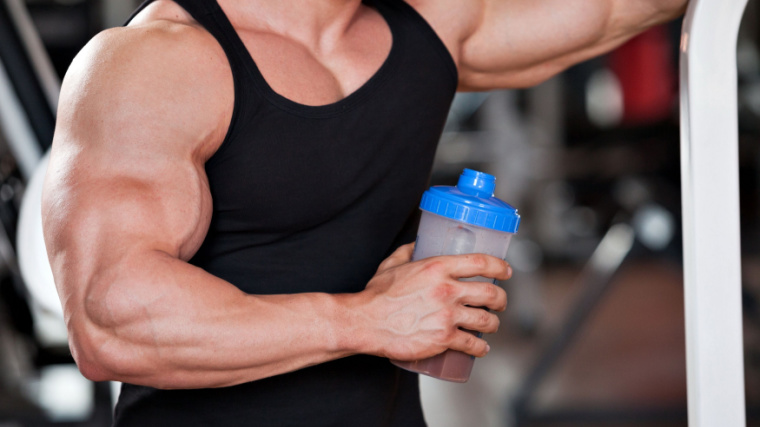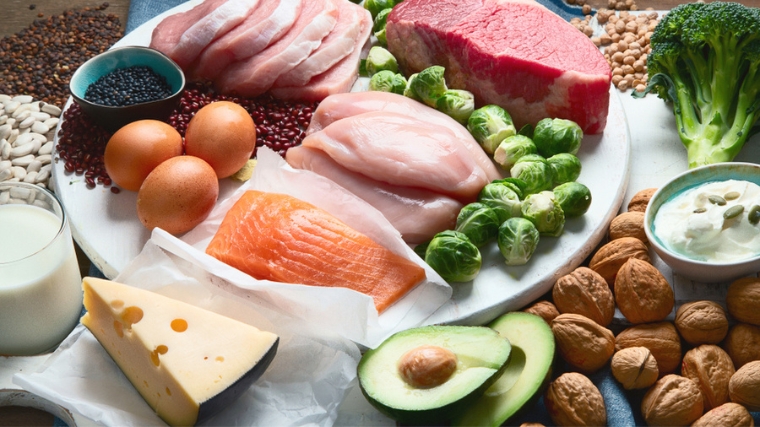Protein is the lifeblood of bodybuilding. An entire industry is built around the idea that bodybuilders need a lot of protein all the time; particularly before, during, and after their workouts. And in the morning as soon as you wake up. Oh, and right before bed, too.
The one-gram-per-pound rule is as close to bodybuilding law as anything can get (other than “rerack your weights,” of course). But is that figure the end-all, be-all of protein consumption for bodybuilding?

As it turns out, things aren’t quite that simple. If you want to maximize your results in the weight room and build the best version of your physique, you need to put down enough protein. That’s a fact. But is one gram enough? As it turns out, it depends. Here is the most up-to-date, evidence-based guidance about protein consumption for bodybuilding.
What Is Protein?
Proteins are polymer chains made up of a series of amino acids which are held together by peptide bonds. But unless you’re a biochemistry student, none of that matters. If you’re interested in health, fitness, or nutrition, all you need to know is that dietary protein is one of the three primary macronutrients (the other two being carbohydrates and fat).
Each gram of protein you consume from food contains four calories of energy. Dietary protein is also essential for the creation and maintenance of muscle tissue; you can think of the amino acids within protein as the building blocks of muscle.
If you’re an aspiring bodybuilder who hits it hard in the gym, you need a lot of protein in your diet to maximize your results. Resistance training incurs damage in muscle tissue, which is then rebuilt bigger and stronger in the hours following a workout. Protein is an integral part of that restorative process.
The exact amount you need to bounce back from a session with the barbell, though, is where things get tricky.
Protein Intake for Bodybuilding
Bodybuilding is a maximalist pursuit; the muscle-minded aren’t generally interested in skating by or doing the minimum. If you hit the iron on a regular basis, you’re probably interested in getting the most from your time and effort: the most muscle gain, the most strength, and so on.
This naturally extends to your diet as well and raises the question: What’s the optimal protein intake for bodybuilding? The answer depends on your definition of optimal and, more importantly, whether you’re bulking or cutting.
Defining “Optimal”
There’s a strong distinction between passable and optimal when it comes to your nutrition. A bodybuilder’s protein needs differ a great deal from those of a person who doesn’t lift weights.
The World Health Organization recommends a daily protein intake of roughly .4 grams per pound of body weight per day for the average person who doesn’t lift weights. (1) However, if that person were to start up a body part split or push-pull-legs routine, their formerly adequate protein intake would quickly become insufficient.

That’s where the idea of optimal comes in — the optimal protein intake for bodybuilding is whatever amount provides the greatest return on your investment in the weight room. That may sound trite, but the specifics matter: In real-world terms, this means eating more than enough protein to facilitate building muscle, but not so much that it dominates your diet at the expense of other macronutrients.
You need to come at this relationship from the right angle. Hitting the weights doesn’t enable you to benefit from protein; a high-protein diet enables you to benefit from your hard work in the gym. Protein is permissive; the more abundant it is in your diet, the more gains you stand to make (up to a point).
Protein Intake for Bodybuilding On a Bulk
If you’re on a bulk — which is to say you’re eating a sustained caloric surplus with the intention of gaining weight — you undeniably need lots of dietary protein to support all that hard work. However, you may not need quite as much as you think.
You’ve probably heard tales of mass-monster bodybuilders bulking up with 300 or more grams of protein per day (along with many thousands of calories). However, an IFBB Pro’s kitchen practices probably aren’t relevant for you. Data from almost 50 scientific papers on protein intake among healthy adults who engage in resistance training showed that an intake of .7 to 1 gram of protein per pound of body weight was ideal for stimulating muscle hypertrophy. (2)
Why it matters: During a bulk, you have access to a surplus of calories from carbs and fat (as well as protein). As such, your body is incentivized to “spare” your protein intake and use it for muscle-building since it has access to ample energy reserves elsewhere.
Protein Intake for Bodybuilding Maintenance
Bodybuilders commonly fluctuate between periods of bulking and cutting, but often find themselves eating at or around their caloric maintenance as well. If you’re neither trying to gain nor lose weight, that .7 to 1 gram per pound of body weight figure still holds true.
Why it matters: At caloric maintenance, your body works with just enough energy to fuel everything you ask of it. You don’t have calories (or extra protein) to spare to build new muscle tissue, but you also don’t need to metabolize your dietary protein for energy.
Protein Intake for Bodybuilding On a Cut
The fewer calories you eat, the more protein you need. During a fat-loss phase, research seems to indicate that dietary protein should become a larger part of your total caloric intake.
Protein has a substantial muscle-sparing effect. If you’re putting yourself through an extended caloric deficit, you’re liable to lose muscle mass along the way if you don’t take precautions. Current data advise upping your protein intake to the realm of .8 to 1.2 grams per pound per day. (3)
Why it matters: During periods of energy restriction, your body is encouraged to convert the macronutrients you consume directly into energy, rather than allowing them to perform other metabolic functions. Extra protein ensures that you can repair and sustain your muscles while you diet down. (4)
Protein Distribution and Timing
Old-school bodybuilding lore declares that, to maximize muscle protein synthesis (and thus your gains), you have to space out your total protein intake evenly over the course of the day to avoid “wasting” it.
This idea doesn’t (entirely) stand up to scientific scrutiny. While it is true that consuming protein acutely elevates muscle protein synthesis, (5) other data shows little meaningful difference between a few high-protein meals or several smaller ones. (6)
More importantly, there isn’t really much scientific basis to the idea that eating “too much protein at once” causes you to waste any of it (whatever that means). Your body will take the requisite time to digest and metabolize the food you give it.
What you need to know: Bodybuilders who follow appropriate training and nutrition plans don’t need to worry about constantly “restarting” muscle protein synthesis; it is chronically (and sufficiently) elevated by lifting weights.
In fact, some data even argues that elevated muscle protein synthesis doesn’t directly correlate to hypertrophic outcomes in the first place. (7)
The bottom line: You probably shouldn’t eat all of your daily protein in one sitting, but most existing evidence indicates that you shouldn’t fret over the details too much.
Benefits of Protein (for Bodybuilding and More)
Protein’s permissive role in your nutrition allows you to reap the benefits of your hard work in the weight room. Without it, you aren’t moving up a shirt size or stepping onto the physique stage anytime soon. That said, a hearty protein intake is good for more than just building (and rebuilding) muscle tissue.
Protein Is Essential for Muscle Growth
To build muscle, you need two things; sufficient dietary protein and enough calories to “fund” hypertrophy. You can, in some niche cases, build muscle in the absence of a caloric surplus (such as if you’re brand new to lifting, are obese, or have been away from the gym for an extended time) but protein is non-negotiable. (8)(9)
The “minimal effective dosage” of dietary protein may be .7 to .8 grams per pound of body weight, but going above that benchmark may contribute to more muscle gain. (10) However, expect some serious diminishing returns to come into play once you’re exceeding 1 to 1.2 grams per pound.
Protein Helps You Bounce Back from Your Workouts
Carbohydrates may be the fuel source that powers your training, but you’ll certainly notice a degradation in the quality of your bodybuilding workouts if you skimp out on protein intake.

This isn’t something you’re likely to notice immediately. If you’re used to having a high-carb meal before training, its absence would probably affect your training almost immediately. However, the effects of a low-protein diet will likely accumulate over the course of a few weeks as your body struggles to recover from the accumulation of tissue damage. If you keep your protein intake consistent, you have one less thing to worry about outside the weight room.
Protein Can Make Cutting Easier
Upping your protein intake is wise if you’re trying to shed fat and hold on to your hard-earned muscle. Protein has a significant muscle-sparing effect, sure, but a high-protein diet may also help you regulate your appetite.
Dietary protein has a marginal effect on your blood glucose levels. (11) As such, you may not experience significant hunger pangs if you pack your daily meals with protein. This is also a benefit of spacing your protein intake out over several meals if you’re cutting.
Protein Builds Strong Bones
Strong and healthy bones are important for both the hardcore bodybuilder and the average gymgoer. Lifting weights is indispensably valuable for strengthening your bones and building resilience as you age, but you shouldn’t overlook the importance of your dietary protein intake as well.
There’s a veritable mountain of research backing the importance of protein for improving bone-mineral density and dampening the risk of osteoarthritis and other associated conditions. (12)(13) So, while you probably down protein shakes for physique-related reasons, it’s worth mentioning the bone health benefits that come along with it.
Best Protein Sources for Bodybuilding
All dietary protein, no matter the source, contains four calories per gram. However, if you want to maximize your results in the gym, you should pay attention to the quality of your protein sourcing. Some protein sources are better-suited to muscle growth than others.

Protein quality may not make or break your results overall, but if you’re trying to nail down every last detail of your nutrition, where you get your protein from matters.
Poultry, Dairy, & Powders
If your dietary practices allow for it, the majority of your protein intake should come from whole-food poultry, dairy, or, in limited quantities, powdered supplements. These food sources contain complete amino acid profiles and are particularly laden with leucine.
Leucine is one of several essential amino acids your body cannot generate on its own, and is a direct precursor to muscle protein synthesis. You’ll find high concentrations of leucine in whey protein powders, chicken, whole eggs, and so on.
Moreover, some data shows that animal protein sources tend to elicit stronger anabolic (as in, muscle-building) responses than plant-based proteins in addition to having more complete amino acid profiles overall. (14)(15)
Vegetables, Legumes, & Grains
Despite being scant on protein density when compared to animal products and supplements, you can still get a decent chunk of protein from beans, lentils, grains, and vegetables. This is particularly important if you’re a vegetarian or vegan bodybuilder.
Foods like soybeans, brown rice, or wheat breads may contain lower concentrations of protein and fewer amino acids, but some is better than none. If you abstain from animal products, you should strongly consider picking up a vegetarian or vegan protein powder that has been infused with extra amino acids.
This can help guarantee that you’re both hitting your protein benchmarks and getting quality protein on a gram-by-gram basis.
Your Takeaways
As a bodybuilder, your diet is just as important as your workouts. This is doubly true for your protein intake, and the exact amount of protein you need will vary depending on your experience level, caloric intake, and goals.
- The age-old one-gram-per-pound benchmark is still broadly accurate, but modern research has helped add nuance to that guideline.
- If you’re in a caloric surplus, you can get away with a slightly lower protein intake. Aim for no less than .7 grams per pound of body weight.
- If you’re cutting down and eating in a caloric deficit, your protein intake (as a proportion of your total caloric intake) should go up. Aiming for as much as 1.2 grams per pound of body weight can help you hold onto muscle tissue.
- There’s a hierarchy of factors that affect your protein intake. Overall daily consumption is more important than how you distribute your protein across your meals, which is more important than the quality of your individual protein sources or the timing around your workouts.
- If possible, consume the majority of your daily protein from animal sources or high-quality supplements. Vegetarian and vegan options are fine, but you may want to turn to supplements to ensure you’re getting all your essential amino acids.
Perfect Your Protein Intake
Bodybuilding is all about chasing perfection. You’re trying to build the most muscular, well-proportioned physique possible, after all. It’s perfectly natural to want to maximize your results outside of the weight room as well, and a large part of that will come down to your protein intake. If you don’t want to settle for “decent,” you need to get your protein right — right down to the last gram.
References
- Joint FAO/WHO/UNU Expert Consultation on Protein and Amino Acid Requirements in Human Nutrition (2002 : Geneva, Switzerland), Food and Agriculture Organization of the United Nations, World Health Organization & United Nations University. (2007). Protein and amino acid requirements in human nutrition : report of a joint FAO/WHO/UNU expert consultation. World Health Organization.
- Morton, R. W., Murphy, K. T., McKellar, S. R., Schoenfeld, B. J., Henselmans, M., Helms, E., Aragon, A. A., Devries, M. C., Banfield, L., Krieger, J. W., & Phillips, S. M. (2018). A systematic review, meta-analysis and meta-regression of the effect of protein supplementation on resistance training-induced gains in muscle mass and strength in healthy adults. British journal of sports medicine, 52(6), 376–384.
- Hector, A. J., & Phillips, S. M. (2018). Protein Recommendations for Weight Loss in Elite Athletes: A Focus on Body Composition and Performance. International journal of sport nutrition and exercise metabolism, 28(2), 170–177.
- Longland, T. M., Oikawa, S. Y., Mitchell, C. J., Devries, M. C., & Phillips, S. M. (2016). Higher compared with lower dietary protein during an energy deficit combined with intense exercise promotes greater lean mass gain and fat mass loss: a randomized trial. The American journal of clinical nutrition, 103(3), 738–746.
- Kim, I. Y., Schutzler, S., Schrader, A., Spencer, H. J., Azhar, G., Ferrando, A. A., & Wolfe, R. R. (2016). The anabolic response to a meal containing different amounts of protein is not limited by the maximal stimulation of protein synthesis in healthy young adults. American journal of physiology. Endocrinology and metabolism, 310(1), E73–E80.
- Macnaughton, L. S., Wardle, S. L., Witard, O. C., McGlory, C., Hamilton, D. L., Jeromson, S., Lawrence, C. E., Wallis, G. A., & Tipton, K. D. (2016). The response of muscle protein synthesis following whole-body resistance exercise is greater following 40 g than 20 g of ingested whey protein. Physiological reports, 4(15), e12893.
- Damas, F., Phillips, S., Vechin, F. C., & Ugrinowitsch, C. (2015). A review of resistance training-induced changes in skeletal muscle protein synthesis and their contribution to hypertrophy. Sports medicine (Auckland, N.Z.), 45(6), 801–807.
- Murphy, C., & Koehler, K. (2022). Energy deficiency impairs resistance training gains in lean mass but not strength: A meta-analysis and meta-regression. Scandinavian journal of medicine & science in sports, 32(1), 125–137.
- Slater, G. J., Dieter, B. P., Marsh, D. J., Helms, E. R., Shaw, G., & Iraki, J. (2019). Is an Energy Surplus Required to Maximize Skeletal Muscle Hypertrophy Associated With Resistance Training. Frontiers in nutrition, 6, 131.
- Tagawa, R., Watanabe, D., Ito, K., Ueda, K., Nakayama, K., Sanbongi, C., & Miyachi, M. (2020). Dose-response relationship between protein intake and muscle mass increase: a systematic review and meta-analysis of randomized controlled trials. Nutrition reviews, 79(1), 66–75. Advance online publication.
- Franz M. J. (1997). Protein: metabolism and effect on blood glucose levels. The Diabetes educator, 23(6), 643–651.
- Groenendijk, I., den Boeft, L., van Loon, L. J. C., & de Groot, L. C. P. G. M. (2019). High Versus low Dietary Protein Intake and Bone Health in Older Adults: a Systematic Review and Meta-Analysis. Computational and structural biotechnology journal, 17, 1101–1112.
- Wallace, T. C., & Frankenfeld, C. L. (2017). Dietary Protein Intake above the Current RDA and Bone Health: A Systematic Review and Meta-Analysis. Journal of the American College of Nutrition, 36(6), 481–496.
- van Vliet, S., Burd, N. A., & van Loon, L. J. (2015). The Skeletal Muscle Anabolic Response to Plant- versus Animal-Based Protein Consumption. The Journal of nutrition, 145(9), 1981–1991.
- Mathai, J. K., Liu, Y., & Stein, H. H. (2017). Values for digestible indispensable amino acid scores (DIAAS) for some dairy and plant proteins may better describe protein quality than values calculated using the concept for protein digestibility-corrected amino acid scores (PDCAAS). The British journal of nutrition, 117(4), 490–499.
Featured Image: Skydive Erick / Shutterstock